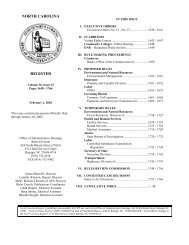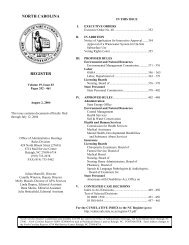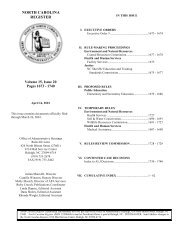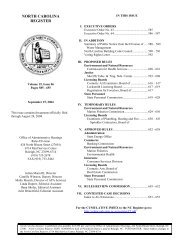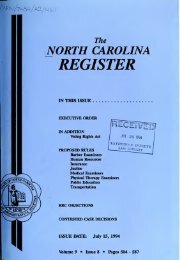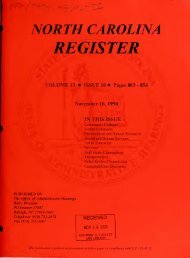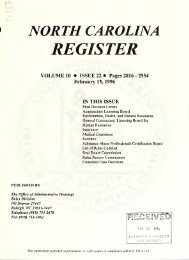NC Register Volume 23 Issue 09 - Office of Administrative Hearings
NC Register Volume 23 Issue 09 - Office of Administrative Hearings
NC Register Volume 23 Issue 09 - Office of Administrative Hearings
Create successful ePaper yourself
Turn your PDF publications into a flip-book with our unique Google optimized e-Paper software.
APPROVED RULES<br />
(c) Air conditioning or at least one fan per resident bedroom,<br />
living and dining areas shall be provided when the temperature<br />
in the facility exceeds 80 degrees F (26.7 degrees C).<br />
(d) The hot water tank shall provide hot water to the kitchen,<br />
bathrooms and laundry. The hot water temperature at all fixtures<br />
used by residents shall be maintained at a minimum <strong>of</strong> 100<br />
degrees F (38 degrees C) and shall not exceed 116 degrees F<br />
(46.7 degrees C).<br />
(e) All resident areas shall be well lighted for the safety and<br />
comfort <strong>of</strong> the residents. The minimum lighting required is:<br />
(1) 30 foot-candle <strong>of</strong> light for reading; and<br />
(2) 10 foot-candle <strong>of</strong> light for general lighting.<br />
(f) Fireplaces, fireplace inserts and wood stoves shall be<br />
designed or installed to avoid a burn hazard to children. Solid<br />
fuel burning fireplace inserts and wood stoves shall be labeled<br />
and approved by a third party testing agency accredited by the<br />
North Carolina Building Code Council for solid fuel heating<br />
equipment.<br />
(g) Gas logs may be installed if they are <strong>of</strong> the vented type,<br />
installed according to the manufacturers' installation instructions,<br />
approved through the local building department and protected by<br />
a guard or screen to prevent children and furnishings from burns.<br />
(h) This Rule shall apply to new and existing licensed facilities.<br />
History Note: Authority G.S. 131D-10.5; 143B-153;<br />
Eff. October 1, 2008.<br />
10A <strong>NC</strong>AC 70I .<strong>09</strong>17 OUTSIDE PREMISES<br />
(a) Outdoor recreational space shall be provided and maintained<br />
in a clean and safe condition.<br />
(b) The grounds and all structures on the grounds <strong>of</strong> the<br />
residential child-care facility shall be maintained to minimize<br />
hazards to the health or safety <strong>of</strong> the children.<br />
(c) Play and recreational equipment shall be located, installed<br />
and maintained to ensure the safety <strong>of</strong> children.<br />
(d) Garbage and rubbish that is stored outside shall be stored<br />
securely in covered containers and shall be removed on a regular<br />
basis.<br />
(e) Trash collection receptacles and incinerators shall be kept<br />
separate from play areas and must be located to avoid being a<br />
nuisance to neighbors.<br />
(f) Fences shall be kept in good repair and shall not prevent<br />
adult staff from exiting or entering freely or be hazardous.<br />
(g) Areas determined by the Division <strong>of</strong> Health Service<br />
Regulation to be unsafe, including steep grades, cliffs, open pits,<br />
swimming pools, high voltage boosters, and high-speed roads,<br />
shall be fenced <strong>of</strong>f or have natural barriers to protect children.<br />
History Note: Authority G.S. 131D-10.5; 143B-153;<br />
Eff. October 1, 2008.<br />
10A <strong>NC</strong>AC 70I .<strong>09</strong>18 VEHICLES USED FOR<br />
TRANSPORTATION OF CHILDREN<br />
(a) Vehicle Requirements for Transporting Children.<br />
(1) Vehicles shall comply with all motor vehicle<br />
laws and regulations for the State <strong>of</strong> North<br />
Carolina.<br />
(2) Motor vehicles shall be maintained in a safe<br />
operating condition, shall be properly<br />
registered, and shall have current, valid<br />
inspection stickers for the State <strong>of</strong> North<br />
Carolina.<br />
(3) A first-aid kit shall be in all motor vehicles.<br />
(4) The bed <strong>of</strong> an open body or a stake bed vehicle<br />
shall not be used for transporting children.<br />
(b) Driver Requirements. The name <strong>of</strong> and a copy <strong>of</strong> a valid<br />
driver's license for each person transporting children shall be<br />
maintained in a separate file at the facility.<br />
(c) Safety Practices for Transporting Children.<br />
(1) The interior <strong>of</strong> each vehicle shall be<br />
maintained in a clean and safe condition with<br />
clear passage to operable doors.<br />
(2) The driver shall assure that all passengers<br />
follow North Carolina laws regarding seat belt<br />
usage and shall adhere to child passenger<br />
restraint laws when transporting children.<br />
(3) The driver shall not transport more persons,<br />
including children and adults, than allowed by<br />
the design capacity <strong>of</strong> the vehicle.<br />
(4) Children shall have at least one 30 minute rest<br />
stop for every four hours <strong>of</strong> continuous travel.<br />
(5) Children shall not be transported for more than<br />
10 hours in any 24-hour period.<br />
(d) Transportation Records. Insurance verification and the<br />
vehicle identification certificate shall be kept in the vehicle in<br />
accordance with State law. Emergency medical information<br />
shall be kept in the vehicle for each child occupying the vehicle.<br />
(e) Insurance. If a residential child-care facility's transportation<br />
services are provided by a private individual, a firm under<br />
contract, or by another arrangement, the facility shall maintain a<br />
file copy <strong>of</strong> the individual's or firm's insurance coverage.<br />
(f) Emergency Transportation. A residential child-care facility<br />
shall have a plan for transporting children when emergency<br />
situations arise that includes:<br />
(1) the need for immediate medical care;<br />
(2) picking a child up at school before the end <strong>of</strong><br />
the school day; and<br />
(3) transporting the child during adverse weather<br />
conditions.<br />
History Note: Authority G.S. 131D-10.5; 143B-153;<br />
Eff. October 1, 2008.<br />
10A <strong>NC</strong>AC 70J .0101 APPLICABILITY<br />
In addition to the rules in 10A <strong>NC</strong>AC 70I .0100 through .0501,<br />
the rules in this Section apply to all persons licensed or seeking<br />
licensure for a children's foster care camp as defined in 10A<br />
<strong>NC</strong>AC 70I .0201.<br />
History Note: Authority G.S. 131D-10.5; 143B-153;<br />
Eff. July 1, 1999 (See S. L. 1999, c.<strong>23</strong>7, s.1130);<br />
Amended Eff. October 1, 2008.<br />
10A <strong>NC</strong>AC 70J .0103 PERSONNEL<br />
(a) Direct service personnel and supervisory personnel, in<br />
addition to supervision and training specified in 10A <strong>NC</strong>AC 70I<br />
.0405(f)(2)(B), (C) and (4)(C), shall be provided supervision and<br />
training in the following areas:<br />
<strong>23</strong>:<strong>09</strong> NORTH CAROLINA REGISTER NOVEMBER 3, 2008<br />
837




